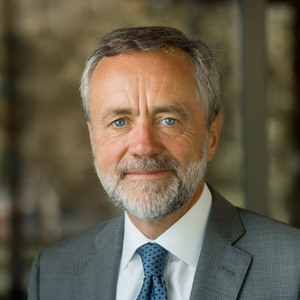Since coming to Biola, I’ve frequently used the language of conviction and courage. Conviction points us back to our core beliefs. Courage is taking a deep breath and moving forward boldly from those convictions. Conviction without courage goes nowhere. Courage without conviction goes anywhere. We need both.
Over the past few months I’ve reflected on the degree Biola’s development into the university we are today is aligned with our founder Lyman Stewart’s vision. At the same time, I’ve been looking to the future asking: Do our University Plan’s Seven Aspirations align with the vision our founders had in mind over a century ago? Lyman Stewart, Biola’s founder and visionary, has left a legacy of archives that have helped me answer this question.
Aspiration 1: Provide Unwavering Leadership Through an Education that is Biblically Vibrant, Centered and Integrated
For Stewart, the knowledge obtained from Scripture — God’s authoritative and inerrant Word — was the highest form of education. The great opportunity and responsibility entrusted to every follower of Jesus was to become “a disciple of the Word of God and a trained Christian Worker.” There was no higher activity or better investment. Stewart was convinced a “good founding” for any Christian enterprise required it be firmly established on sound biblical doctrine.
Aspiration 2: Attract and Develop the Best and Brightest Christian Scholars
The Bible Institute, in Lyman Stewart’s mind, would help stem the tide of 19th century intellectual liberalism in many churches and colleges. At Biola’s founding, Stewart said that God “laid the foundations [of Biola] over a quarter of a century ago, when the work of undermining the faith in the Word of God began to take a definite shape in this country.” An antidote to culture’s crescendoing liberal voices was to counter their arguments with sound scholarship from a theologically conservative posture.
Aspiration 3: Lead in Spiritual Development and the Proclamation of the Gospel
From the beginning, Biola has been committed to disciple making. A century ago, Lyman Stewart made sure discipleship was integrated into the educational programs of this young school. We continue to champion spiritual development and proclamation of the gospel at the heart of our planning. To be a great university means we must be a Great Commission university. This is not just in our history. It must be in our future.
Aspiration 4: Cultivate Competent and Courageous Graduates
Lyman Stewart desired that Biola students and faculty commit to impacting Los Angeles, the Pacific Rim and the wider world to bring “Honor and Glory to … Christ.” His burden was great for the less fortunate, the immigrants, the neglected, the abandoned, homeless, jobless and hopeless “in whom we see represented the ‘every creature’ to whom our Savior would have us preach the Gospel.” He also believed that humanity’s sinfulness could not be remedied by “societal redemption.” Our calling is to the task of compassion, rescue and faithful witness to the truths of the “Kingdom not of this world.”
Aspiration 5: Nurture a Cross-Cultural Christian Community
Stewart said of the Institute in his 1913 Cornerstone Address: “... all people regardless of race, color, class, creed, or previous condition, will ever be welcome to its privileges.” I imagine he’d encourage us as leaders to reinforce this expectation to attract and nurture a diversity of ethnicities and cultures across both faculty/staff and student populations. In so doing we become more than ever a university that reflects the breadth of God’s people across the country and around the world.
Aspiration 6: Extend our Educational Reach Throughout the World
Stewart advocated non-traditional and far-reaching educational delivery, focusing on the technologies of transportation and communication. He founded in 1916 the first satellite campus of Biola, establishing the Hunan Bible Institute in China. From 1907 to 1915, he also sponsored the establishment of various Bible institutes in Korea. The Bible Institute of Los Angeles became known widely as a visionary, an innovator and collaborator and a forerunner of educational accessibility. We must follow our heritage in doing likewise.
Aspiration 7: Ensure the Affordability of a Biola Education
Stewart wanted all students desiring an education for Christian service to afford Biola. He wrote that it “always seemed to me very uncomplimentary to the future church, to think that it would not take care of its own current work. By [funding] … immediate work, there will be a much stronger constituency created to take care of the work in the future.” Financial support of the generation being educated is that “stronger constituency” which will take care of the work in the future.
Should we still be concerned about what Lyman Stewart would think? Of course. But far more we must be focused on whether we are still a university that is true to the heart of God. To be this way demands to believe in Truth with conviction and to have courage for that which God can still do through us. This has been our heritage, and this will be our future.
Barry H. Corey is the president of Biola University. Visit his office online at www.biola.edu/president, on Facebook at facebook.com/presidentcorey and on Twitter at twitter.com/presidentcorey. He is particularly indebted to Paul Rood, a historian and grandson of Biola’s third president, whose research and writing contributed greatly to this article.
 Biola University
Biola University
.jpg)

